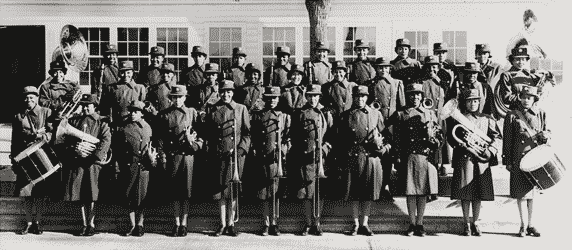Excerpt from "Women's Military Bands in a Segregated Army: The 400th and 404th WAC Bands," Journal of Band Research, 41(2), Spring 2006, 1–35

404th WAC Band
The women’s band at Fort Des Moines was popular with the fort personnel, and it was not long before the African-American WAC musicians were requesting membership in the group. After all, the Army had declared “there would be no discrimination in the types of duties that black women could perform.”57 However, this did not include band participation. Black women, when inquiring about joining the white band, were denied membership based on segregation policies. The black WAC officers then determined the black troops needed a band of their own and requested of Colonel Frank McCoskrie, the fort’s commandant, that one be started.
Major Charity Adams, the highest-ranking African-American officer at the fort, described the start-up of the band in her book One Woman’s Army:
"There was no authorization for this second band its members were carried as permanent training personnel on the various reports. . . . I kept sending, as did other COs [commanding officers], qualified women to try out for the WAC band. Regardless of their experience, whether they were private and public school music teachers, teaching and performing majors in college and graduate school, amateur and professional performers, no Negroes who auditioned were found to be qualified to play with the white band. For a race that was reputed to have the best sense of rhythm in the world, with exceptional dancing and singing skills, this constant failure seemed odd. We were slow to “catch on,” but we eventually did. A few of us decided to organize our own Negro WAC Band."58
In September 1943, Colonel McCoskrie met with Master Sergeant Joan Lamb and gave her an order to start a black band. She still remembers the moment today, “The Colonel announced to me that I was going to form a black WAC band. I later learned, after the girls really got to the point where they felt that I could be totally trusted, the black officers felt it was terrible that there was no black band so they wanted to form one.”59 Sergeant Lamb--a band teacher before the war--was thrilled with the assignment and looked forward to recruiting women to form what would initially be called WAC Band #2. |